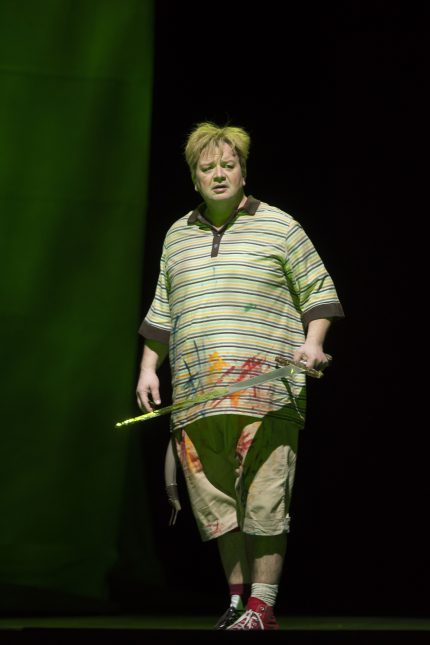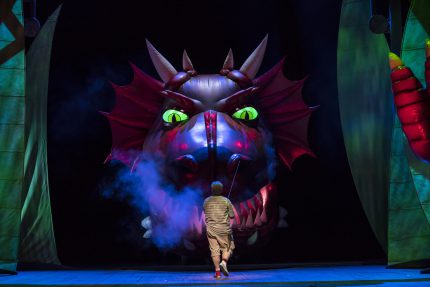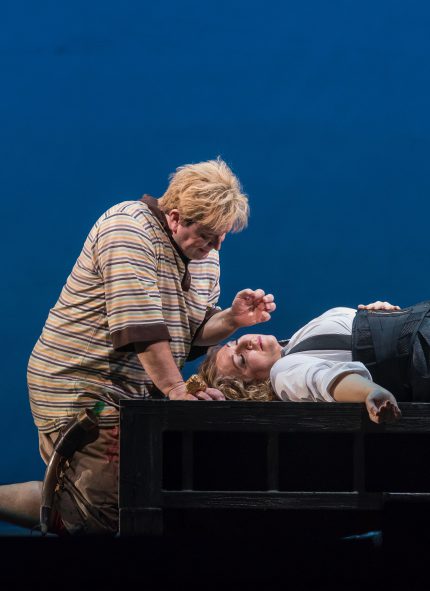Inspired singing wins out over trivial staging in Lyric Opera’s “Siegfried”
A critic at Lyric Opera’s opening performance of Wagner’s Siegfried couldn’t help feeling like a sportswriter at a hotly contested baseball game—one had to mentally rewrite one’s lede as the volatile score shifted after every inning (or each Act, in this case).
The singing of a sturdy-to-inspirational cast ultimately won out over the grievous production unveiled at Saturday night’s Siegfried—a ying-and-yang tussle that has characterized this wildly uneven Ring cycle helmed by David Pountney. But for most of the evening, it was a close call as to whether Wagner would prevail over the British director’s penchant for low comedy and snarky revisionism.
When last we left the Volsungs, Siegmund was dead, and his sister and lover Sieglinde on the run. The god Wotan put his daughter Brünnhilde into a deep sleep surrounded by fire for her disobedience in aiding the escape of the incestuous siblings. Siegfried, their son, has been raised by the Nibelung dwarf Mime; he has a devious plan of using the young hero to recapture the Rheingold from the giant Fafner, who has transformed himself into a dragon, the better to guard his treasure. Siegfried must slay the dragon, recapture the powerful ring and awaken and rescue the dormant Brünnhilde—all in just four hours of opera.
The penultimate work of the four operas that make up Wagner’s tetralogy of gods and gold, Siegfried has never achieved the popularity of the two preceding operas, Das Rheingold and Die Walküre. (Lyric is only presenting four Siegfried performances.) The dominance of male voices for two-thirds of the long evening make it a dark work in coloristic terms, as well as dramatically. But the heights Siegfried reaches make the long stretches worthwhile: his forging of the sword Notung, the Forest Murmurs and beckoning Wood Bird of Act 2, and especially, the extended love scene that concludes the opera, as Siegfried awakens Brünnhilde with a kiss and they fall immediately and passionately in love.
The demythologizing perspective of Lyric’s Ring—stage mechanics in full view, etc.— would be more creditable if director Pountney came up with something dramatically compelling and on point to replace the winged helmets and other hoary traditions.
But, as the previous two operas in this series have shown, the British director seems to think the Ring is a ludicrous joke and something to be ridiculed rather than reinterpreted. There is intentional comedy and moments of absurdity in each opera of the Ring, to be sure. But there is also courage, profound emotional and psychological depths and a nobility of expression in the music and the characters— qualities that seem largely foreign to Pountney’s trivial perspective. Why Lyric Opera would engage a director for an expensive Ring cycle who seems to have contempt for this Wagner epic is an open question.
There was nothing quite as vile in Lyric Opera’s new Siegfried as Act 3 of Die Walküre last season, when Pountney turned the gathering of Valkyries into a Hammer Films horror show with blood flying and dismembered body parts. But there was plenty of the same tired, would-be comedy and condescending satire.
Siegfried is a headstrong youth, a brave but not very bright or experienced man-child in many ways. Raised by Mime, he has no experience of life but he knows he must escape the stifling malignity of Mime’s hut to learn of his family origins and search for his life’s meaning in the broader world.
In Pountney’s typically exaggerated negative view, there is nothing courageous, heroic or even very likable about Siegfried, who is here depicted, not as an impetuous youth but as a backward five-year-old. Clad in cheap modern pullover shirt and shorts, stained with crayon, Siegfried drags dolls around and plays with them in a steel dog cage that serves as a playpen. Likewise, Mime’s hut is a Playskool nursery with childlike scrawling on the walls of the opera’s elements (bird, dragon and sun). Siegfried doesn’t forge Notung out of his own strength and ability; instead in another of the director’s lame gags he does so with the aid of numbered steps on a message board, aided by mimes who wheel high-tech forging devices onstage from “Rhein Logistix.” Wotta riot.
And so it goes. The forest of Act 2 is depicted by extras carting luminous green leaves, so blindingly bright that they obscure the principals. Alberich runs onstage and fires a gun in the air for no reason at the end of Act 2. Pountney must be running low on dumb ideas (one can hope) since he swiped the dubious conceit of Alberich as cart-pushing vagrant from Francesca Zambello’s San Francisco-DC Ring.
Mercifully, the director mostly stays out of the way in Act 3. Yet even here Siegfried and Brünnhilde conduct most of their extended love scene positioned wide apart on either side of the stage in separate children’s cells festooned with party balloons. If only one could borrow the Tarnhelm for the evening and make Pountney disappear.
Surprisingly, the most traditional element of the production is the most successful, with a terrific dragon created for Fafner with huge claws and glowing eyes that lurk menacingly in the background. If only the production team had applied their skill more effectively like that, aiding Wagner’s vision and making it work rather than seeking to undermine and lampoon it.
One felt sorry for Burkhard Fritz in the title role. The German tenor was forced to make his American opera debut in ugly and unflattering kid’s clothes, a visual drag that inevitably undermined his best efforts throughout the evening.
Fritz has sung many Wagner roles in Europe. Yet this was his first Siegfried and the lack of experience in this intensely challenging assignment was fitfully manifest. The stocky singer clearly has the stamina for the role, making it through the long evening without evident strain or fatigue.
But he also sounded underpowered at too many key moments, Fritz’s tenor failing to open up with the muscle and clarion ring it should in the forging scene and elsewhere. His acting was rather rudimentary and one-dimensional as well, but that was likely attributable to the director’s misconceived characterization of Siegfried as juvenile doofus.
Fritz brought an affecting sensitivity to Siegfried’s introspective rumination about his unknown mother. And he rose to his finest singing (and acting) of the evening in the final scene putting across the requisite ardor and impassioned vocalism in the concluding love duet.
Christine Goerke is a supreme and complete artist who seems to consistently inspire colleagues to their finest capabilities. Such was the case with her Brünnhilde, Goerke sparking Fritz’s Siegfried to his best singing of the night. For her part Goerke brought her rich, gleaming soprano tone and touching depth of expression to the awakened Valkyrie. The final scene can be a minefield for unwonted humor “(“Das ist kein Mann!”) but Goerke’s acting chops made Brünnhilde’s conflicted feelings seem real and plausible as well as her genuine passion for the benighted hero. It’s worth persevering through this exasperating production to get to the final half-hour of memorable Wagner singing.
Like Fritz, Matthias Klink was also making his role debut as Mime. Yet as the creepy dwarf, Klink seemed completely at home in this role from the curtain. His stringy long hair and spindly presence created an aptly repellent Mime—arguably, the strangest character in the entire Ring, which is saying something. Klink’s nervous energy and high, flexible tenor made a worthy foil to Fritz’s bumpkin Siegfried. The German tenor fully embodied the joyful evil and faux-solicitousness of the malignant dwarf who has raised Siegfried with an ultimate goal of using him to steal the gold.
As The Wanderer (aka Wotan), Eric Owens has clearly grown more comfortable with the role of the chief god since the 2015 Das Rheingold. He brought an understated dignity and natural authority to the role—a god who here is losing control over events, and has his power destroyed by the courageous yet clueless Siegfried. At times one would have liked greater dramatic bite earlier in the evening, but Owens brought incisiveness to his Act 3 exchanges with Erda and bristling intensity to his confrontation with Siegfried. Owens also showed surprising physical grace walking on semi-stilts throughout Act 1, though—like most things in this production—the gimmick served little clear purpose. If the idea was to make Mime seem truly of dwarf-like stature, why is he the same height as Siegfried?
The dramatic temperature of the evening jumped several notches with the return of Samuel Youn’s Alberich in Act 2. Youn brought huge bass tone and scary intensity to the begetter of the Ring curse (Mime’s villainous brother), singing with vocal fury and snarling vindictiveness. Can you imagine Thanksgiving dinner with these two?
Patrick Guetti made a deep and well-rounded Fafner, his amplified bass providing sonorous ballast for the narcoleptic dragon. Onstage in the giant’s final moments Guetti brought a sympathetic, even fatherly presence with his final words of advice to his slayer.
Conversely, mezzo Ronnita Miller lacked the underground contralto depths for Erda, but brought sure dramatic impact to her Act 3 dialogue with Wotan, some jarring wobbliness apart.
As the Wood Bird, Diana Newman got no help from the staging, here a life-sized mechanical doll controlled by Wotan, perched on the gods’ overheard parapet. But Newman brought an apt bright soprano and nimble flexibility to the forest avian who aids Siegfried.
Apart from that appalling getup for Siegfried, Marie-Jeanne Lecca’s costuming was her most successful of the cycle to date, particularly Wotan’s uber-cool cloak and hat. Robert Innes Hopkins’ scenic designs worked effectively even when the philosophy behind them was gravely dubious. Apart from the dragon, Fabrice Kebour’s atmospheric lighting was the most consistent production element of this wayward show, especially when it kept the visual ugliness in shadow.
After a very slow Prelude to Act 1, Andrew Davis kept things on track and moving, a welcome virtue in a five-hour evening (including two 30-minute intermissions). Lyric’s music director accompanied the singers with customary skill and climaxes were built with sure, inexorable impact.
Still, one would have liked greater foreboding and atmosphere in the Prelude to Act 2. More troubling, the orchestra—even with extra players—sounded decidedly light in sonority, more so than in past Wagner performances. There was a lack of richness and depth of tone—possibly due, at least in part, to the economic down-sizing of the core ensemble.
Even with that, the Lyric Opera Orchestra rose to the mammoth challenge of this score with customary skill and dedication. Brass and woodwinds tackled their prominent solos with notable distinction and character.
Siegfried will be repeated 1 p.m. Wednesday and November 11 and 6 p.m. November 16. lyricopera.org
Posted in Performances





Posted Nov 07, 2018 at 8:28 pm by John Fischer
I agree that the production was beyond idiotic. It was insulting and juvenile. The glorious singing more than made up for it. Fritz was stunning as Siegfried, managing to become stronger as the evening wore on. Amazing performance!
Posted Nov 12, 2018 at 11:06 am by Peter Rosenfeld
Agree. Dreadful production, as was last year’s Walkure, and Faust. I will avoid next year’s Ring. I am a board member of Wagner Society, though I write here as a private citizen. I hope Anthony Freud reads these views and gets a new director.
Posted Nov 12, 2018 at 3:18 pm by Donald Hoffman
Just wanted to add one more voice in agreement. A ghastly production, wildly inventive and utterly pointless.
Posted Nov 14, 2018 at 9:38 am by LC
What? I disagree!! I loved it! I have seen many Siegfrieds and I thought this production was enjoyable and engaging. This is geared for a different generation. The opera company need to stop bringing boring productions like “I Puritani” from last year’s season and “Idomeneo” this year. We saw Siegfried three times and loved every moment of the opera.
Posted Nov 17, 2018 at 10:00 am by Artemesia
Agree — inventive but ridiculous. Some of the effects like the animated childish drawings in the nursery were cool — but pointless. And we fully expected Siegfried to change costume as he moved from the nursery to his quest. Having him in silly toddler garb throughout was idiotic and detracted from the story.
The staging of the final act was laughable from the glowing pool noodles to the willy blue and pink toddler chairs and party balloons.
The acting was weak; the singing was magnificent for the most part; the staging — well I wish it were like Paris where the director comes on stage and is roundly booed for a production like this.
Posted Nov 17, 2018 at 10:10 am by KEW
How did this review not point out that putting Mime in a dress, gloves and purse built on the worst tradition of Siegfried? Historically Mime was styled as a Jew to emphasize his ugliness and unworthiness; the director “modernized” by styling him as a transgender person. It’s such an ugly choice.
I totally agree that dressing Siegfried as a messy, rude little five year old completely undercut the idea of him as a romantic hero in the final act, and frankly made me sympathize with Mime in the first and second acts.
Posted Nov 17, 2018 at 1:32 pm by Bill
Everyone defending the sanctity and preciousness of the ring cycle and decrying its mockery needs to take a step back – fascism is on the rise globally; Bolsonaro just got elected in Brazil. Look, I love the ring cycle too, but get a grip everybody, and admit that it’s fascist as hell and right now it needs to not be taken seriously.
Posted Nov 19, 2018 at 9:44 pm by Peter Borich
Can’t wait for a toddler clothed Siegfried throughout Gotterdammerung, who will be vivisected by Hagan in the Third Act and his body parts carried in a duffel bag during the Funeral March. Admittedly, the Dragon in Siegfried was fantastic
Posted Nov 21, 2018 at 8:05 am by TG
This production was a good argument for bringing back radio broadcasts. I’d love to listen to it again, just as long as I didn’t have to be distracted by watching it.
Just dressing Siegfried as some sort of brave warrior (maybe even ripping off his play clothes) after he slays the dragon, alone, would make it so much less distracting and more credible in the remaining part of the opera. Make that change before the 2020 cycle.
Posted May 13, 2019 at 6:59 am by Tom in Vermont
Nowhere in Wagner’s writing or in Cosima’s diaries are any of Wagner’s characters referred to as Jewish. There is no doubt that Wagner was deeply flawed in these areas as were many of his contemporaries, but such ascriptions are not based in fact.
As a side-light, the first Zionist convention in 1897 included a performance of Tannhauser.
Posted Oct 16, 2019 at 1:11 am by vinnynewyork256
Pountney’s MAnon Lescaut at La Scala was moving, original, Fin de siècle. But this is pure TRASH … an embarrassment and an insult to Wagner. STOP with silly, pop, frusrated exaggeration. Game over.